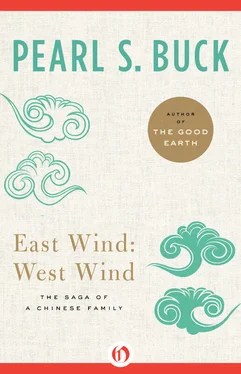But I can say nothing because our speech together is broken with words not understood.
To-day my brother and his wife have removed themselves to his ancestral home. They will live in the old apartments where my brother spent his youth. She will not be allowed to sleep or eat or linger in the women’s apartments. Thus my mother still refuses to recognize her.
Now that they are gone, I am glad to be alone with my husband and my child, and yet with their going some life has departed from the house. It is as if the west wind departed at sunset and left stillness that was yet a little dead.
I think of them and picture them in the old rooms alone together. I said to my husband last night,
“What will come of all this trouble?”
He shook his head in doubt. Then he said,
“With those two under one roof, the old and the young, it is iron meeting flint. Who can tell which will crush the other?”
“And what will come of it?”
“Fire of some sort will come of it,” he replied gravely. “I pity your brother. There is no man able to stand unmoved between two proud women, one of them old and one of them young, and both loving him supremely.”
He took our son upon his knee and regarded the child thoughtfully. I do not know what was in his mind. But the child innocently lifted the lock of hair over his ear in pride to display the ring his grandmother had hung there, crying,
“See, Da-da?”
Instantly we forgot my brother and his wife. My husband looked at me with suspicion and reproach.
“Kwei-lan, what is this?” he asked. “I thought we were done with this superstitious nonsense!”
“Your mother placed it there,” I faltered, “and I had not the heart—”
“Nonsense!” he cried. “We must think of the child first! We cannot let him be given such ideas.”
And taking out from his pocket a small knife, he carefully cut the silken thread that held the ring. Then leaning he threw it all out of the window into the garden below. When the child pouted, he said laughing,
“You are a man like me! See, I do not wear a ring in my ear like a woman. We are men. We are not afraid of gods!”
And the child smiled at his gay words.
But in the darkness of the night I thought of it half-afraid. Can age be forever wrong? What if after all there are gods? I would leave nothing undone for my son. Ah, how I understand my mother!
I DID NOT VISIT my mother’s home for twenty days. I was weary and a little unwell, and when I thought of my mother and of my brother, the confusion of my mind increased. When I remembered my husband, my heart turned to my brother, and when I held my son in my arms, my heart cleaved to my mother.
Moreover, my mother did not send for me, and had I gone unbidden I should not have known how to greet her or to explain my coming. But staying much alone in the quiet house — you know how my son’s father works all day and into the night — I wondered and imagined many things.
How was the foreigner spending the long, lingering days? Had my mother seen her again and spoken to her? I knew the slaves and the concubines would be excited and would watch her from behind corners, and the servants would make excuses to fetch tea for my brother and this thing and that in order to see her, and the talk in the kitchen quarters would be about her and her ways and her looks, her bearing and her speech, ending always in reproach that she was there at all and pity for the daughter of Li.
At last my brother came to see me. I sat one morning embroidering a pair of shoes for my son — you know it is only seven days more until the festival of Clear Spring — and suddenly the door opened and my brother came in unannounced. He wore Chinese dress, and he looked more as he did in his youth than at any time since his return. Only his face was grave. He sat down and began talking without greeting, as though we continued the conversation from some previous hour.
“Will you not come, Kwei-lan? My mother is very feeble, and I think she is ill. Her will alone remains as strong as ever. She has made a decree that for a year my wife must follow the life of a Chinese woman in the courts. Since my whole inheritance depends on her obedience, we are trying to follow my mother’s wishes. But it is like caging a golden oriole! Come and bring the child.”
He rose and walked restlessly about the room, and when I saw his distraction I promised him.
I went therefore that same afternoon to visit my mother, thinking that I might on the way through the courtyards stop to see that other one, my brother’s wife. I dared not allow my mother to know that I came to see anyone else except her alone, and indeed I was determined that I would not even mention the foreigner to my mother unless she gave me opportunity.
I went straight into my mother’s presence without lingering in the courts, although as soon as I came into the women’s quarters the Second Lady came to the threshold of the moon-gate and beckoned to me from behind an oleander tree. But I merely bowed and passed on into my mother’s presence.
After my greetings were over we spoke first of my son, and then I took courage to examine my mother’s face. I thought her looking a little better, in spite of my brother’s words, or at least not as ill as I had feared. I did not question her therefore of her health, knowing that such inquiries always irritated her, although she never failed to answer courteously. I asked instead,
“How do you find your son, my brother, changed by his years away?”
She lifted her pointed eyebrows slightly.
“I have scarcely spoken to him of anything of importance. The question of his marriage to the daughter of Li of course awaits his father’s coming. But he seems more like himself, at least, since I sent word that he was to wear his accustomed clothes when he returned home. I was not pleased to see my son’s legs in trousers like a water-carrier’s.”
Since she had spoken of his marriage I affected to ask carelessly, examining the pattern upon the silk of my robe,
“And how do you find the blue-eyed foreigner?”
I was conscious of a stiffening in my mother’s body, but she merely coughed and then answered with negligence in her voice,
“As for that one, the foreigner within the courts, I know nothing about her. I sent for her once to prepare my tea, since your brother tired me with his beseeching that she be allowed to come into my presence. But I found I could not endure her awkward hands and barbarous looks. She was very clumsy about my person. I perceive that she has never been trained in the proper behavior to an elder. I shall not try to see her again. I am happier when I can forget the matter and remember only that my son is again under the ancestral roofs.”
I was surprised that my brother had not told me that she had been called to make tea for our mother. It was a moment of importance. But when I considered I decided that he had purposely not told me of it, since she had been so unpleasing to our mother. But remembering my brother’s anxiety I asked further, greatly daring,
“May I invite her to spend an hour in my poor house, since she is a stranger here?”
She answered coldly,
“No, you have done enough. I shall not allow her to go outside the great gate again so long as she remains here. She must learn the seclusion proper to ladies if she is to live here. I do not care to have the whole city talking of the matter. I perceive she is lawless and unrestrained, and she must be controlled. Speak no further of her.”
The rest of our talk was carefully of nothing. I saw that she would not speak of anything below the surface of each day’s casual happenings — the salting of the vegetables for the servants, the rise in the price of cloth for the children’s clothes, the promise of the chrysanthemum slips now being planted for the autumn’s flowering. I said farewell, therefore, and went away.
Читать дальше











